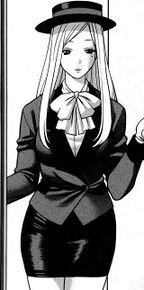Elevator attendant: Difference between revisions
mNo edit summary |
mNo edit summary |
||
| Line 20: | Line 20: | ||
* The strong influence of [[Demopolis|demopolitan]] and [[gauchic]] ideals and aesthetics on Gylian society and culture. Elevator attendants thus gained both recognition as a symbol of cosmopolitan urban life and [[Culture of Gylias#Luxury|socialised luxury]]. | * The strong influence of [[Demopolis|demopolitan]] and [[gauchic]] ideals and aesthetics on Gylian society and culture. Elevator attendants thus gained both recognition as a symbol of cosmopolitan urban life and [[Culture of Gylias#Luxury|socialised luxury]]. | ||
* The transformation of [[Gender and sexuality in Gylias|gender]] norms. The profession was both conceptually de-genderised and aesthetically {{wpl|feminisation of the workplace|feminised}}, and came to be seen as a way to quickly bring women and other minorities into the workforce. | * The transformation of [[Gender and sexuality in Gylias|gender]] norms. The profession was both conceptually de-genderised and aesthetically {{wpl|feminisation of the workplace|feminised}}, and came to be seen as a way to quickly bring women and other minorities into the workforce. | ||
* The IPL's successful promotion of automation and {{wpl|refusal of work|anti-work}} sentiments. Automation was accompanied by restrictions on {{wpl|self-service}}, allowing professions that provided patterns of civilised sociability to thrive — including elevator attendants, {{wpl|tea lady|tea servers}}, {{wpl|filling station attendant}}s, | * The IPL's successful promotion of automation and {{wpl|refusal of work|anti-work}} sentiments. Automation was accompanied by restrictions on {{wpl|self-service}}, allowing professions that provided patterns of civilised sociability to thrive — including elevator attendants, [[tray vendor]]s, {{wpl|tea lady|tea servers}}, {{wpl|filling station attendant}}s, telephone operators, and {{wpl|taxi dancer|paid dance partners}}. | ||
==Current role== | ==Current role== | ||
Latest revision as of 09:01, 24 November 2019
An elevator attendant (French reformed: Préposée d'ascensceur) is a Gylian occupation that involves operating an elevator. While manual elevators no longer exist in Gylias, the profession has survived, becoming a role analogous to a flight attendant and being a familiar facet of Gylian society.
History
The profession of elevator operator first appeared in Alscia. Department stores pioneered the role of combining the roles of operator, greeter, and guide into one, a strategy adopted by other commercial establishments.
Between the 1920s and 1930s, automated elevators gained ground against manual elevators. The Liberation War disrupted this development. Elevator operators remained familiar to the Free Territories, and began to appear in films and gauchic art.
Following independence, the work of the Institute for the Protection of Leisure resulted in the automation of elevators in Gylias. Nevertheless, the profession survived by transformation from elevator operator to elevator attendant, and continued to do well.
Several factors contributed to the continued success of elevator attendants:
- The ideal of "public luxury" led to high service quality and a glamorous image for the public sector (railways, air travel), which spread to other service occupations.
- The strong influence of demopolitan and gauchic ideals and aesthetics on Gylian society and culture. Elevator attendants thus gained both recognition as a symbol of cosmopolitan urban life and socialised luxury.
- The transformation of gender norms. The profession was both conceptually de-genderised and aesthetically feminised, and came to be seen as a way to quickly bring women and other minorities into the workforce.
- The IPL's successful promotion of automation and anti-work sentiments. Automation was accompanied by restrictions on self-service, allowing professions that provided patterns of civilised sociability to thrive — including elevator attendants, tray vendors, tea servers, filling station attendants, telephone operators, and paid dance partners.
Current role
Elevator attendants are found in every elevator in Gylias, although low-rise buildings predominate. A variety of building codes and municipal regulations amount to a national ban on anyone but elevator attendants operating the buttons of an elevator during working hours.
Attendants greet users, press the buttons for the desired floors, make announcements, provide information, and engage in conversation with users. The profession is prized for its role in maintaining a good atmosphere and providing sociability in buildings.
Elevator attendants receive extensive training in public speaking, social graces, and grooming, and are known for their smiling demeanour and stylish uniforms. Common elements of attendant uniforms include shirts, waistcoats, skirt suits, white gloves, and hats.
In popular culture
Elevator attendant is a widespread occupation with strong public support, and thus is well-represented in Gylian popular culture.
Elevator attendants are commonly depicted with a focus on the charisma and glamour that the job entail. They are common in animation and cinema, and have often been protagonists or point-of-view characters in genres such as orgone films and telefoni bianchi films.
They also appear in numerous pornographic works, which mainly eroticise their clothing or play on the profession, depicting them having sex in elevators or juxtaposing the sophisticated, refined character of elevator attendants with hypersexual or risky behaviour in their spare time.
Many Gylian actors and models worked as elevator attendants among their first jobs, or moved into acting and modeling as a result of being noticed as elevator attendants.

